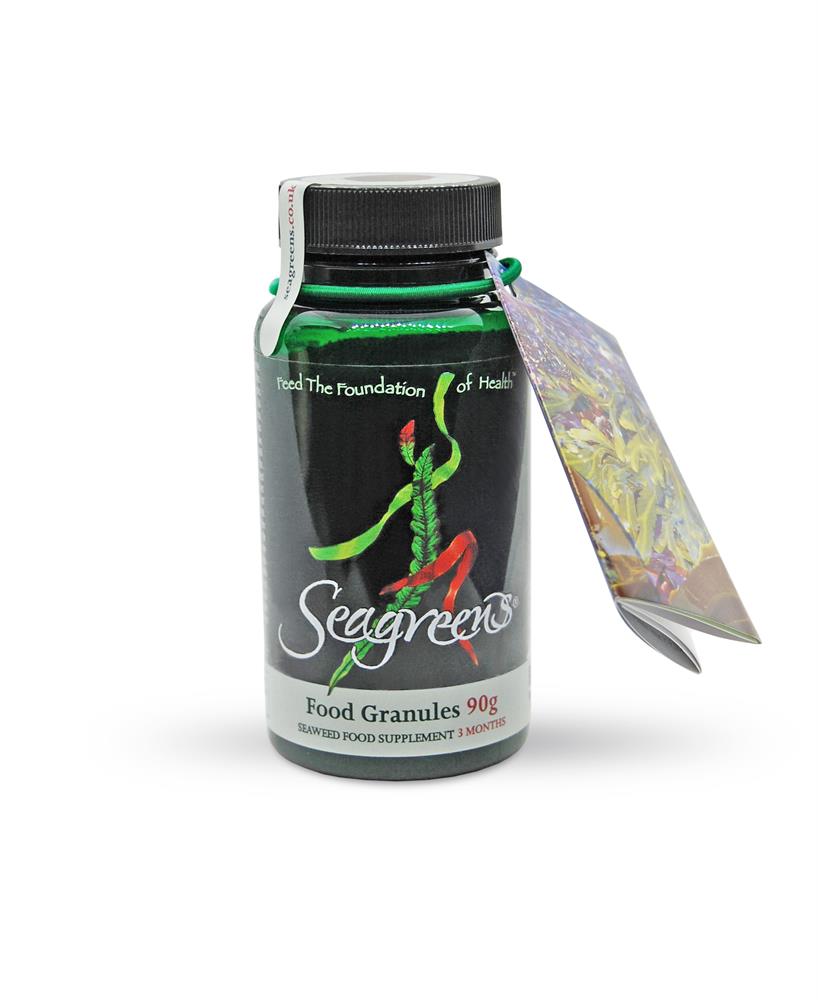
Food Granules 90g is an expertly blended nutrient-rich foundation for a balanced daily diet. It is made of winged kelp, knotted wrack, bladderwrack and channel wrack seaweeds, providing natural multinutrients. With this food product, you can supplement your diet with essential minerals and vitamins.
Independent analytical data
Over the past decade we have built up a unique body of data on the composition of our native wild seaweeds for which there is no academic or commercial parallel.
Typical nutritional values are averages over the past decade. Several times each year, each batch we harvest is comprehensively analysed by the same methods at independent, government accredited laboratories in the UK, USA and EU.
Nothing is added to or extracted from our seaweeds, which are certified to Nutritious Food Seaweed standard by the BDA (UK Biodynamic Association). They are also BRC (British Retail Consortium), Organic, Kosher for Passover, compliant for Halal, Vegan, and non-allergenic for any special dietary requirements, free from any harmful contaminants.
The Seagreens® project has significantly improved nutrient values through its pioneering production with 5 harvesting locations in the British Isles and Nordic region over the past quarter century. That is why leading food and nutrition brands use Seagreens® ingredients in their own products.
All data are copyright protected and all rights reserved by Seagreens Trust. The data applies only to seaweeds produced by Seagreens. Reproduction in any form for public, commercial or professional use without written permission is prohibited. The word Seagreens is a registered trade mark of Seagreens International Partnership Trustees Ltd.

| Typical nutritional values | Independent analytical data | |
|
|
|
|
|
Food Granules per 1g - approximately 0.04oz or 1/2 a level teaspoon 1g (gram) = 1000mg (milligram) = 1,000,000µg (microgram) Amino acids Alanine 1.14 mg, Arginine 0.50 mg,, Aspartic acid 1.88 mg, Cystine and Cysteine* 0.21 mg, Glutamic acid 1.91 mg, Glycine 0.87 mg, Histidine 0.30 mg, Isoleucine 0.64 mg, Leucine 0.07 mg, Lysine 0.79 mg, Methionine 0.22 mg, Phenylalanine 0.89 mg, Proline 0.24 mg, Serine 0.80 mg, Threonine 0.89 mg, Tryptophan 0.19 mg, Tyrosine 0.69 mg, Valine 0.83 mg. Antioxidant capacity and principal antioxidant nutrients Alpha-linolenic acid (ALA) 1,733.89 µg, Calcium 12,580 µg, Copper 0.961 µg, Magnesium 8,030 µg, Polyphenols 18,409.72 µg, Potassium 25,470 µg, Selenium 0.14 µg, Superoxide dismutase 59.48 µg, Tannins 62,890 µg, Vitamin A (carotenoid precursors) 14.43 µg, Vitamin C 251.10 µg, Vitamin E (alpha-tocopherol) 83.22 µg, Zinc 24.01 µg. Betaines Glycine Betaine trace, Gamma Amino Butyric Acid Betaine trace, Delta Amino Valeric Acid Betaine trace, TML (Laminine) trace, L-Carnitine trace, Trigonelline trace. Carbohydrates 544.32 mg of which total dietary fibre is 462.74 mg including non-starch polysaccharides Algin, Fucose, Fucoidan, Mannitol, Methylpentosans, Laminarin, Mannuronic acid and Chlorophyll (antioxidant). Soluble fibre is approximately 18% of total dietary fibre, insoluble 82%. Enzymes Protease 346.49 units (pH7.4), Uronic acid 17.92µg/g. Essential fatty acids Total EPA and DHA Omega-3 1.84 mg, Omega-3 4.57 mg, Omega-6 13.35 mg, Omega 9 19.17 mg, Oleic acid 3.26 mg, Alpha-linolenic acid (ALA) (antioxidant) 1.73 mg, Eicosapentenoic acid (EPA) 1.82 mg, Docosapentaenoic (DPA) 0.014 mg, Docosahexaenoic acid (DHA) 0.014 mg, Monounsaturated fatty acids 16.25 mg, Polyunsaturated fatty acids 13.02 mg, Saturated fatty acids 7.80 mg, Trans fatty acids 0.64 mg. What are essential fatty acids? Minerals Calcium (antioxidant) 12.58 mg, Magnesium (antioxidant) 8.03 mg, Nitrogen 8.94 mg, Phosphorus 4.75 mg, Potassium (antioxidant) 25.47 mg, Sodium 31.60 mg, Sulphur 40.67 mg. Polyphenols 18,490.72 µg (antioxidant). Proteins 57.41 mg. Sugars Fructose 1.33mg, Glucose 1.25mg, Maltose 1.00mg, Sucrose 1.00mg. Trace elements Antimony 0.23 µg, Barium 10.76 µg, Beryllium 0.001 µg, Bismuth 0.001 µg, Boron 117.83µg, Cerium 0.48 µg, Copper (antioxidant) 0.96 µg, Dysprosium 0.03 µg, Erbium 0.02 µg, Europium 8.23 µg, Gadolinium 0.04 µg, Gold 0.07 µg, Holmium 0.006 µg, Iodine 390 µg, Iron 393.73 µg, Lanthanum 0.24 µg, Lithium 0.63 µg, Lutetium 0.002 µg, Manganese (antioxidant as a component of Superoxide dismutase) 94.28 µg, Molybdenum 0.67 µg, Neodymium 0.19 µg, Palladium 14.48 µg, Platinum 0.28 µg, Praeseodymium 0.05 µg, Rubidium 9.17 µg, Samarium 0.04 µg, Scandium 0.06 µg, Selenium (antioxidant) 0.135 µg, Silicon* 250.19 µg, Silver 0.07 µg, Terbium 0.005 µg, Thallium 0.006 µg, Thuliam 0.10 µg, Titanium 5.52 µg, Vanadium 2.02 µg, Ytterbium 0.007 µg, Yttrium 188.98 µg, Zinc (antioxidant) 24.01 µg. Vitamins A (precursor carotenoids, including betaine carotene, fucoxanthin and violaxanthin) (antioxidant) 14.43 µg, B1 (thiamin) 0.55 µg, B2 (riboflavin) 0.20 µg, B3 (niacin or vitamin PP) 81.29 µg, B5 (pantothenic acid and calcium pantothenate) 2.38 µg, B6 (pyridoxine) 0.6 µg, B9 (folate) 1.32 µg, B12 (cobalamin) 0.002 µg, C (antioxidant) 111.29 µg, E (alpha-tocopherol) (antioxidant) with all the isomers of wheat germ 98.69 µg, H (biotin or vitamin B8) 86.12 µg, K (phytomenadione, K1 phylloquinone, K2 menaquinone 4 and menaquinone 7) 0.374 µg. |
||


